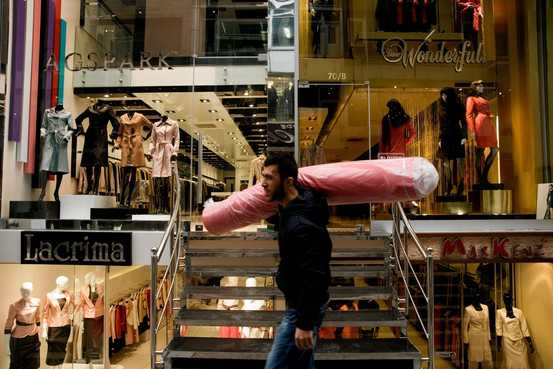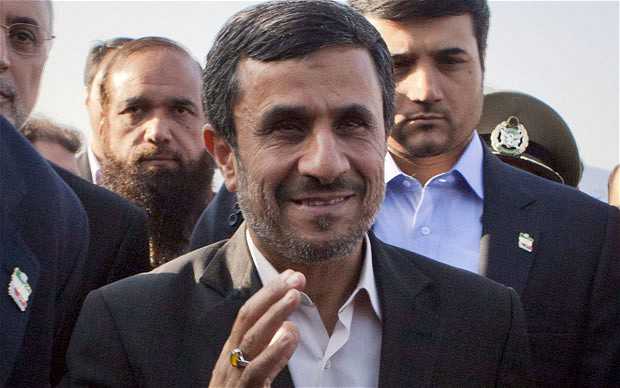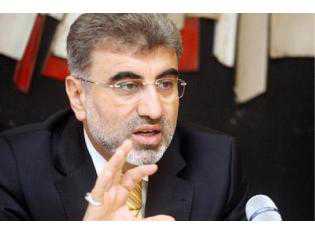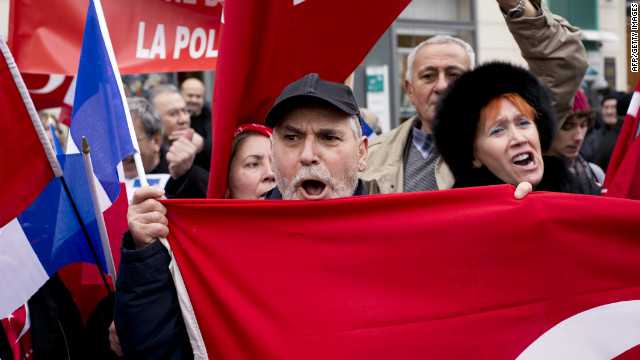By JOE PARKINSON
ISTANBUL—When Yasar Kapiyoldas landed hundreds of orders worth tens of thousands of dollars in Iran, he thought his clothing company could offset losses from its slowing Europe and Middle East markets.
Just two months later, with fresh sanctions causing a run on the currency and soaring inflation in Iran, every one of Mr. Kapiyoldas’ orders has been canceled. Some clients have defaulted on their payments. Thousands of garments made for the conservative Iranian market are now gathering dust in his company’s depot.

A worker in Istanbul’s Osmanbey textile district, where businesses that previously profited from Iranian trade are now coping with overstock.
“We thought Iran would be the solution after the revolutions killed our business in Libya, Tunisia and Egypt,” says Mr. Kapiyoldas from his smoke-filled office above a clothing store in Istanbul’s Osmanbey district, where more than 4,000 textile retailers jostle for space—and market share—in an area of about one square mile. The businesses had also attracted Iran’s youthful population, which lapped up more-contemporary designs from established producers in Turkey, a regional textile hub.
“We have thousands of long ladies’ overcoats that were ready to ship to Tehran that we can’t sell anywhere else,” he said. “Now what am I going to do with them?”
The fresh wave of sanctions feeding panic in Iran’s economy are hitting businesses in North Atlantic Treaty Organization-member Turkey, upending a boom in bilateral trade that was underpinned by improving diplomatic ties. Turkish exports to Iran, which surged 12-fold in the past decade to top $3.5 billion last year, plunged 25% in January from December, as sanctions pushed the real value of Iran’s currency, the rial, as much as 55% lower against the dollar.
[TURKIRAN]
All Turkish banks but one have stopped processing payments for Iranian customers, while higher costs have seen the number of Iranians visiting Turkey tumble.
Turkey has refused to adopt tougher unilateral sanctions against Iran from the U.S. and the European Union, instead stressing its commitment to the weaker United Nations measures passed in 2010, and to buying Iranian oil and gas, albeit at a declining rate. But the deteriorating trade business removes a major tie between Ankara and Tehran, which are increasingly splitting along sectarian lines over Middle East conflicts.
“A trade relationship that has grown rapidly in recent years is now being pressured by politics,” said Arzu Celalifer, a professor of international relations at USAK, the International Strategic Research Organization, in Ankara. “That trade decline is one component of how Turkey and Iran increasingly have differences on Middle Eastern issues. They’re now just trying to preserve the minimal mutual interest,”
Last year, the pressure being levied on Iranian traders’ rials by sanctions was offset by a sharp decline in the Turkish lira, which fell almost 20% against the dollar as investors became nervous about Turkey’s overheating economy.
But when new U.S. sanctions targeting Iran’s central bank in January sent Iran’s currency plunging, the lira began to surge, making the relative cost of some Turkish products almost double in price in the space of a few days, traders say.
The rapid price increase was aggravated by the refusal of Turkish banks—except for state-owned Halkbank—to process trade deals involving Iranian customers for fear of being frozen out of international markets by the new sanctions regime. Iranian businessmen now pay for orders with cash carried across the border in suitcases
As a result, businesses across Turkey that had expected sales to surge in the run up to the Persian New Year festival this week, are now bracing for a sustained slump and, in some cases, mothballing stock.
Travel agents report that tourist numbers and hotel bookings fell as much as 80% from last year, and tourist spending has fallen sharply.
“Sanctions have hammered their currency, so Iranian companies are now terrified because our business is done in dollars,” said Ali Ulvi Orhan, head of Osmanbey textile traders association. “Our members are badly affected because the Iranians have basically disappeared. Even if they’re here, many can’t pay.”
Turkey’s trade with Iran has been lopsided—Iranian exports of natural gas to Turkey made up more than 70% of the $12.5 billion total last year. But that ratio has declined in recent years as strengthening diplomatic ties and visa-free travel boosted trade in everything from textiles to flat-screen televisions.
Data published Thursday show that trend accelerating, as Turkish imports of crude oil from Iran plunged 40% on the month in December, partially offset by an 86% rise in purchases from Saudi Arabia.
Traders say pockets of bilateral business continue on a small scale, but at much lower volumes. For some Turkish merchants, the dramatic collapse of a trade relationship that Ankara actively cultivated until late last year has prompted anger and frustration, as politics trump traders’ livelihoods.
“This year we were expecting two million Iranians for New Year for the first time ever, but we won’t have anywhere near that many,” said Esadullah Renjber, owner of Tehran Tour, a tour operator based in Laleli, a district popular with Iranian tourists. “I’ve worked here for 30 years and I’ve never seen anything like this and it has all to do with politics.”
—Ayla Albayrak contributed to this article.
via Iran Sanctions Put Wrinkle in Turkish Trade Deals – WSJ.com.





